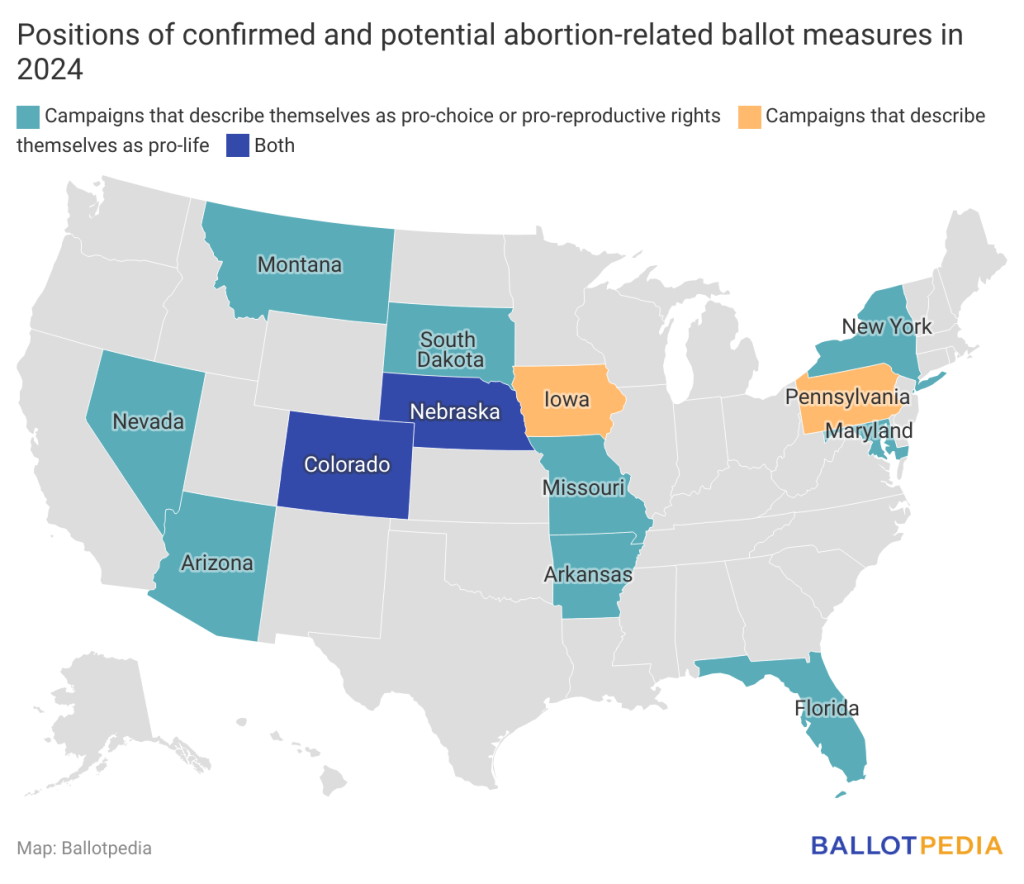In November, voters in Ohio approved Issue 1, which established the right to an abortion in the state constitution. Since the U.S. Supreme Court’s decision in Dobbs v. Jackson Women’s Health Organization in 2022, which overruled Roe v. Wade, there were seven abortion measures on the ballot, including the 2023 Ohio measure.
In 2022, voters in three other states—California, Michigan, and Vermont—approved ballot measures providing a state constitutional right to an abortion. Like Ohio Issue 1, the ballot measures in California, Michigan, and Vermont were designed to provide state constitutional rights to an abortion. In Kansas and Kentucky, voters rejected ballot measures to state that nothing in their state constitutions creates a right to abortion or requires government funding of abortions. In Montana, voters rejected a measure called the Born-Alive Infant Protection Act.
In 2024, two abortion-related constitutional amendments will appear on the ballot in Maryland and New York, and 14 measures have been proposed in 11 other states. Potential ballot measures are either in the process of circulation for signatures or need to be passed by the state legislature to qualify for the ballot.
States with confirmed abortion-related ballot measures in 2024
- Maryland: Voters in Maryland will decide on an amendment to establish a right to reproductive freedom, defined to include abortion, in the state constitution at the general election in 2024. The amendment was referred to the ballot by the Maryland State Legislature.
- New York: Voters in New York will decide on a constitutional amendment to prohibit the denial of rights to an individual based on their "pregnancy, pregnancy outcomes, and reproductive healthcare and autonomy," along with other classes like ethnicity, disability, age, and sex. The amendment was referred to the ballot by the New York State Legislature.
States with potential abortion-related ballot measures in 2024
- Arizona: Arizona for Abortion Access filed a ballot initiative and launched a signature drive in Sept. 2023 to put a constitutional amendment on the ballot. The amendment would establish the fundamental right to abortion that the state of Arizona may not interfere with before the point of fetal viability.
- Arkansas: Arkansans for Limited Government formed as a ballot question committee to sponsor a citizen initiative that would amend the Arkansas Constitution to prohibit laws or policies restricting abortion access within 18 weeks from conception; in cases of rape, incest, or fatal fetal anomaly; or when an abortion is needed to protect the life or health of the mother. On Nov. 28, 2023, Arkansas Attorney General Tim Griffin (R) rejected the ballot language and found certain sections to be misleading. The ballot language for the amendment must receive approval from the attorney general for signature gathering to begin.
- Colorado: Two initiatives that would amend Colorado law regarding abortion are circulating currently—one initiative that would prohibit the state or local governments from denying or impeding a right to an abortion and allow abortion to be a covered service under health insurance plans, and one that would prohibit abortion in the state.
- Florida: Floridians Protecting Freedom is leading the campaign in support of an initiative that would amend the constitution to provide that "no law shall prohibit, penalize, delay, or restrict abortion before viability or when necessary to protect the patient’s health, as determined by the patient’s healthcare provider." The initiative is under review by the Florida Supreme Court.
- Iowa: The Iowa State Legislature passed a constitutional amendment in 2021 that would add a section to the state constitution saying “this Constitution does not recognize, grant, or secure a right to abortion or require the public funding of abortion.” For the amendment to appear on the ballot in 2024, both chambers of the Iowa state legislature need to pass the amendment again.
- Missouri: Two abortion-related citizen-initiated constitutional amendments were approved to circulate in Missouri. One would establish a right to reproductive freedom, and the other would provide that state will not deny or interfere with the right to choose to have an abortion in the case of rape or sexual assault, incest, fatal fetal abnormality, or risk to the health or safety of the woman seeking an abortion.
- Montana: An initiative was filed in Montana that would amend the state constitution to provide for the right to make and carry out decisions about one’s own pregnancy, including the right to abortion. The initiative has not yet been approved for signature circulation.
- Nebraska: Two abortion-related citizen-initiated constitutional amendments were approved to circulate in Nebraska. One would establish a right to abortion until fetal viability, while the other would prohibit abortion procedures and drugs except in cases to preserve the life of the mother.
- Nevada: The Nevadans for Reproductive Freedom PAC is leading the campaign in support of a constitutional amendment that would establish the right to reproductive freedom, which would include the right to make and carry out decisions about matters relating to their pregnancies, including abortion. The amendment has been approved to circulate.
- Pennsylvania: The Pennsylvania state legislature passed a constitutional amendment in 2022 that would say that the constitution grants no right to a taxpayer-funded abortion or any other right relating to abortion. To make the 2024 ballot, both chambers of the Pennsylvania state legislature would need to pass the amendment again by a simple majority.
- South Dakota: Dakotans for Health is leading the campaign in support of a constitutional amendment that would make abortion legal in South Dakota with regulations after the first and second trimesters. The amendment has been approved to circulate.
The following map shows the positions of the confirmed and proposed ballot measure campaigns for 2024. Each state indicates proposed or confirmed measures with campaigns that describe themselves as pro-life or campaigns that describe themselves as pro-choice or pro-reproductive rights. Colorado and Nebraska have both kinds of proposed measures and campaigns in the state.




